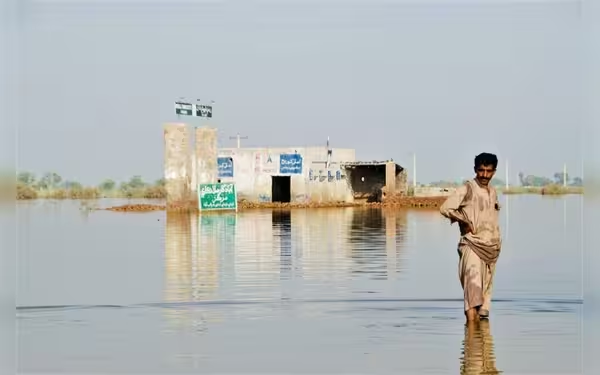Wednesday, July 3, 2024 10:20 PM
World Bank Urges Pakistan to Enhance Climate Resilience
- Pakistan faces $30 billion losses due to climate change-induced disasters
- Priority transitions include improving agricultural and food systems
- Investing in education and healthcare crucial for building climate resilience
 Image Credits: thefridaytimes
Image Credits: thefridaytimesThe World Bank urges Pakistan to enhance climate resilience to mitigate $30 billion losses and achieve poverty reduction goals. Priority transitions include improving agriculture, sustainable cities, and investing in education and healthcare.
Climate change-induced disasters in Pakistan, such as heatwaves and floods, are hindering the country's economic growth and efforts to reduce poverty. Recent data shows that Pakistan has suffered losses of $30 billion due to extreme weather conditions affecting agriculture, livestock, and infrastructure.
The World Bank's Country Climate and Development Report (CCDR) warns that climate change, air pollution, and environmental degradation could lead to an 18-20% decrease in Pakistan's GDP growth by 2050. This poses a serious risk to the country's poverty reduction goals, highlighting the urgent need to protect the economy from climate-related challenges.
To build resilience, Pakistan must attract private investments in key sectors like agriculture, urban infrastructure, water management, housing, and municipal services. Implementing effective policies in these areas is crucial for adapting to climate change and minimizing its impact on the nation.
The World Bank report outlines five priority transitions for enhancing climate resilience in Pakistan. It emphasizes the importance of improving agricultural and food systems to support vulnerable communities. Urgent actions are required to address issues like water overuse, land degradation, and harmful agricultural practices that threaten food security.
Additionally, the report underscores the need to develop sustainable cities that can withstand climate risks and accommodate the growing population. Reforms in municipal services, transportation, and energy efficiency are essential for creating livable urban environments resilient to environmental challenges.
Pakistan's energy sector, crucial for economic development and poverty alleviation, faces challenges like greenhouse gas emissions and financial burdens. Shifting towards renewable energy sources, enhancing energy efficiency, and implementing fair tariffs are recommended solutions to tackle these issues.
Investing in education and healthcare to empower the population with knowledge and skills is vital for building climate resilience. Equipping people with the necessary tools will enable them to adopt eco-friendly practices and enhance their ability to cope with environmental threats.
Pakistan needs a comprehensive strategy involving collaboration with the private sector and international partners, with a focus on energy efficiency. The recent establishment of a climate authority by the Supreme Court demonstrates the government's dedication to addressing climate challenges promptly and effectively.













